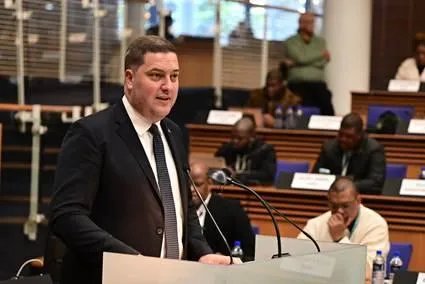Opposition parties criticise City’s budget for misrepresenting poor communities

Cape Town Mayor Geordin Hill-Lewis addressing City Council on the adoption of the metro’s Invested in Hope Budget 2025/26 on 26 June.
Image: Supplied / City of Cape Town
OPPOSITION parties have accused the City of misrepresenting the realities faced by poor and working-class communities in adopting the 2025/26 budget.
The final budget tabled during Council meeting on Thursday highlighted a range of revisions, which Mayor Geordin Hill-Lewis introduced said were aimed at easing cost burdens for pensioners and middle-income households while preserving the City’s multibillion-rand infrastructure investment programme.
“Our budget asks a little more of those who can afford it, while protecting basic services for those who can’t afford it,” Hill-Lewis told councillors.
“The budget was largely welcomed by lower-income residents, and we’ve also managed to significantly lower increases for middle-class residents, in the end building broad support for the budget across the city.”
The mayor announced significant enhancements to pensioner rebates, including a 100 percent rates and cleaning charge rebate for those earning up to R10,000 per month, up from the previous R7,500 threshold.
“A 50 percent rebate will now be available up to R20,000 income, 20% up to R24,000 income, and 10% up to the R27,000 max threshold,” he said.
He also revealed that 97% of ratepayers would avoid electricity tariff increases above 20%, thanks in part to the removal of a 10% City cleaning surcharge from electricity prices.
“Thousands of households will pay less to consume electricity from 1 July,” Hill-Lewis said.
Fixed water and sanitation charges, previously based on pipe size, will now be determined by property value.
The mayor said this would lead to lower fixed charges for homes valued under R2.5 million.
Addressing the retention of fixed charges linked to property value, Hill-Lewis said: “The only other alternative... is for everyone to pay a flat charge regardless of whether you are low-income or affluent. We must be clear that lower-income and wealthy households cannot make equal contributions... It’s not fair, nor sustainable.”
Despite these revisions, opposition councillors issued scathing rebukes of the budget and its priorities.
GOOD party councillor Axolile Notywala said: “The DA’s failures, lies and denialism in this budget are killing Black and Coloured children in Cape Town. Just yesterday, a child almost drowned while walking from school in a flooded street because the DA-led City of Cape Town failed to maintain drainage systems. This was in Parkwood, not in Clifton.”
Notywala accused the DA of using “PR stunts” while neglecting the infrastructure needs of poor communities.
ANC councillor Xolani Sotashe described the budget as “investing in falsehoods and continuous deception.”
He added that many of the capital projects listed in the budget were not new.
“Some of the capital projects contained in this budget are as old as 10 years, yet the mayor talks as if these projects are new. Service delivery delayed is service delivery denied.”
Sotashe said key public concerns included the introduction of fixed charges, poor road and sanitation infrastructure, lack of enforcement of by-laws, poor maintenance of municipal facilities, and weak public engagement.
National Coloured Congress councillor Nasmi Jacobs said: “Again, the public is deceived by the millions and billions made available, but in reality, our communities will not see that money. The same mayor couldn’t make R600 million work for staircases on the Cape Flats. So how would he be able to work with these billions?”
Hill-Lewis concluded by defending the administration’s long-term vision.
“We are budgeting for the next 20 years, not just the next 12 months. And yes, to do this, we’ve had to make difficult decisions. But they are the right decisions for a city that is determined to be a city of hope for all.”
Cape Times